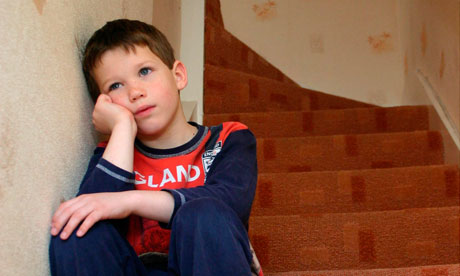
One in 11 children are unhappy, according to a survey by the Children's Society. I thought it would be more. Children aren't stupid, and happiness and an interesting life are not always the same thing: misery, at certain times, is as important to the development of the psyche as rage. Only imbeciles claim to be happy all the time. To me, a nation of happy faces is a Stepford nation; in fact, one of the first nations to introduce a happiness index was Thailand in 2006, straight after a military coup.
Even so, if you do a sum, you can come up with a figure of 500,000 unhappy British children, and this is an opportunity for society to gather round and angst, because who doesn't want children to be happy? The explicitly-wanting-children-to-be-unhappy lobby would go, I suspect, the way of the North American Man/Boy Love Association, which wants to legalise paedophilia because some children, they maintain, enjoy it. Nowhere.
Even so, this survey is an addition to the current vogue for happiness indicators. Last year, the Office for National Statistics added four questions about happiness to its integrated household survey and it will report in July. The happiness jargon makes me laugh – I don't expect either the prime minister or the leader of the opposition to care if I am happy because neither of them, thankfully, is my mother.
I instinctively mistrust a politician who asks me how I feel, particularly if that politician is about to dismantle mental health services, which not only exist to do precisely that job but can actually have a practical impact on any response. And if politicians give serious airtime to the data I shall be very unhappy, because, as the government seems committed to making some seriously unhappy people even unhappier with its attacks on the benefits system, it bespeaks hypocrisy. Abolish any number of social projects committed to things less subjective than happiness – employment, education, social mobility – and then ask people if they are happy? That is a terrible trade-off, spat right out of the Ministry of Truth's raddled gums. Reinstituting the education maintenance allowance would make me much happier than being asked if I am happy, which I am not.
And what a woolly, windy word "happiness" is, no friend to sensible policy-making. It is a rerun of Inspector Morse for some and committing date rape, undetected, for others; pretty much every human activity has its fans by now and not all of them are to be encouraged. The government may vex about happiness while entirely abandoning its pre-election green agenda, and if London drowns as a result, no one is going to be terribly happy. But it serves to fill the air with warm phrases like the "big society" did, before it emerged that it was wind in a box – meaningless, and a beard for the abolition of the welfare state. Nor do I trust this emphasis on the happiness of children, as distinct from the happiness of adults. Society is divided by class and gender, not age, and I worry less for a five-year-old who frequents Baby Dior than a 55-year-old cancer patient whose benefits are under threat. Children are not a cabal of tiny saints that walk among us and deserve a special ladle of sentiment, which is withdrawn at 16.
As Zoe Williams has pointed out, children are not separate. They live among us and they become us. Attacking unhappiness in children without attacking unhappiness is adults is surely pointless, since the Children's Society reported that it is loving familial relationships that made children truly happy, not Xboxes and sweets, which is both obvious and to their credit, even as it may make advertisers less than happy.
So where is the cut-off point? The British social attitudes survey last year reported a hardening in attitudes to the vulnerable, and blaming the disadvantaged for their predicament is one of the nastier ideologies of this unhappy age. It has been forecast that there will be more children in poverty by the end of this administration – so when does the compassion fuse bust? At 11? 12? 13-and-three-quarters? We can only wait for more data to tell us. In the meantime, behold the cuts and wonder, how do you feel?
• Follow Comment is free on Twitter @commentisfree

